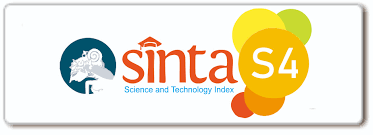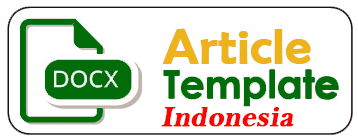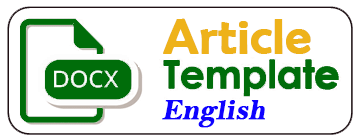Policies
- Focus and Scope
- Section Policies
- Peer Review Process
- Publication Frequency
- Open Access Policy
- Reviewer/Editor Join
- Publication Ethics
- Subscribe Policy
- Copyedit and Proofread
- References Management
- Plagiarism Checker
- Archiving Policy
- Deposit Policy
- Publication Charge
- Waiver Policy
- Indexing and Abstracting
Focus and Scope
Ulumuddin: Jurnal Ilmu-ilmu Keislaman (UJII) is a national medium of diffusion and exchange of the up to date information on the research findings on Islamic Studies in Indonesian context. With special interest on Islamic education and law on muslim societies as the main focuses, This journal present the research results of the formal, informal and non-formal Islamic education, sociology of Islamic education, history of Islamic education, philosophy of Islamic education, fikih/usul fikih, socio legal, Islamic legal history, Islamic legal philosophy, Kalam and Islamic philosophy, Quran and Hadis science, Islamic economic.
Section Policies
Article
Short Communication
This section contains the main page of short communication articles full text of no more than nine pages, in the form of a design/concept of subsequent research.
Peer Review Process
- Every article will be selected through initial manuscript evaluation processes by Editorial Board. Those Manuscript evaluated by editors to be inappropiate to journal criteria are rejected promptly without external review. Manuscript evaluated to be of potential interest to our readership are sent to double blind reviewers.
-
Reviewer receives a double-blind review manuscript from the section editor. If not in accordance with his/her competence, reviewer has the right to reject the manuscript and recommend it to other reviewers who are more competent.
-
Two reviewer at least reviewed a manuscript and a manuscript was minimally reviewed by two reviewer. Reviewer assesses the manuscript from the writing quality and substance aspects, which includes the renewal, authenticity, usefulness, validity of citation and bibliography.
-
The editors then make a decision based on the reviewer’s recommendation. The manuscript will be adjudged into one of four categories: (1) accepted for publication (2) accepted with minor modifications, (3) accepted with major modifications and (4) not accepted.
-
Review Process: (1) author submit the manuscript; (2) editor Evaluation; (3) double-blind peer review process; (4) editor Decision; and (5)confirmation to the authors. Its take a month (four week) for a maximum time.
Publication Frequency
Open Access Policy
Reviewer/Editor Join
-
Prospective reviewer or editor must have an interest in, and enthusiasm to improve journal reputation and quality, and has relevancy of competencies to the scientific scope of the journal.
-
Prospective reviewer/editor contact the secretariat to be registered at the journal website. As proof of expertise, the reviewer and editor inform the scientific publication databases, such as Google Scholar, Garuda, Academia, OrcidID and so on.
Publication Ethics
Author Ethic
-
Reporting; author should report the process and results of their research fairly, clearly, precisely, accurately, thoroughly, and impartially as well as save the data well. Honesty is expected in presenting any data and information listed in content and research results.
-
Originality; author makes a statement that the paper submitted to the journal editor is original (from the author's own ideas), has never been delivered and published in any media, in any language, and not in the process of submission to another publisher. The case of publication duplication and deception, the article is subject to be removed from this journal.
-
Clear sources; author should mention and ensure that any reading materials used as citations and bibliography are written clearly and completely. Author is strictly forbidden to quote the writings of others without citing the original source.
-
Responsibility; author is fully responsible for the data and research writings, in terms of methods, analysis, calculation, and details. If verification is required from editor and reviewer, the author is willing to answer it clearly, precisely and fairly.
-
Agreement; author ensures that the names listed in the article are based on contributions of ideas and thoughts every author and have been approved by the entire team of author. Any changes, reductions or additions of author names, should be approved the team of author. Any other parties contributing fully (non-substance) in writing this paper, the author expresses their gratitude to the relevant parties.
-
Punctuality; author revises and edits the manuscript punctually for the sake of discipline and regular journal publication. Otherwise, the author is ready to take the consequences, which is the delay of journal article publication.
-
Disclosure of conflicts of interest; author upholds copyright and privacy of one another to avoid conflicts of interest. In the event of a conflict of interest with other parties, the author must solve it justly and wisely.
Editor Ethic
-
Neutrality; the editor is neutral in selecting and screening manuscript. The editor must be objective and fair to every author who submitted their written works. The editor is forbidden to be discriminative to the author in terms of gender, ethnicity, religion, race, intergroup, or nationality.
-
Reporting; editor reports the selection and reviews scripts clearly and accurately to the author based on accuracy, completeness, and clarity of reporting of result research and its development, including editing techniques and the use of guidelines for publication and screenwriting.
-
Communicative; editor communicates effectively and efficiently in the process of publishing the journal. Every suggestion and criticism from the author, reviewer, and journal manager should be addressed clearly, fairly and transparently.
-
Fairness; editor distributes the manuscript to editor team member and reviewer fairly based on their respective competence.
-
Professional; editor works professionally based on his duties and responsibilities. The editor should understand any policy related to journal publication. Editor ensures that every script has undergone the editorial process and review correctly, fairly, and objectively.
-
Responsibility; editor takes full responsibility for the success of journal publication. Editor guarantees that every journal article published is a new paper and not a copy, and gives benefits to those reading and accessing the journals.
-
Disclosure of conflicts of interest; editor upholds copyright and privacy of each other to avoid conflict of interest. Should a conflict of interest arise with other parties, an editor must solve it justly and wisely.
Reviewer Ethic
-
Neutrality; reviewer is fair, objective, unbiased, independent, and only in favor of scientific truth. The script review process is carried out professionally without distinguishing the author’s background. Reviewer is prohibited conduct a review of papers involving himself, either directly or indirectly.
-
Professional; reviewer should be critical and professional in assessing a paper (related to his expertise), open about new things, able to keep the secret of the things being assessed, does not take personal advantage of the paper he assesses, as well as has a passion for improving written works. Reviewer has the right to refuse a script if it does not correspond to his expertise. He then can recommend it to the other more competent reviewer in accordance with the scope of the publication.
-
Quality assurance; reviewer has a duty to assist editor in improving the quality of paper he reviews. Reviewer analyzes papers on the substance not on grammar, punctuation, and typos. The reviewer is required to uphold the basic principles and scientific analysis in the process of reviewing a paper. Reviewer works on the principle of truth, novelty, and originality; prioritizes benefit of the paper for the development of science, technology, and innovation; as well as understands the impact of paper on the development of science.
-
Punctuality; reviewer reviews the manuscript and gives a response to the editor quickly, expected to be on time. If the time is not enough, the reviewer then informs the editor with a clear reason for the sake of discipline and regularity of journal publication.
-
Disclosure of conflicts of interest; reviewer upholds copyright and privacy of each other in order to avoid conflicts of interest. Should a conflict of interest arise with other parties, the reviewer must finish it justly and wisely.
Journal Manager Ethic
-
Decision-making; journal managers should define the vision, mission, and goals of the organization in journal publication based on the recommendation of the reviewer and the editorial board. To do so, journal managers are neutral and free from conflicts of interest of individuals or groups, business aspects, aspects of ethnicity, religion, race, and intergroup.
-
Freedom; journal managers give freedom to the reviewer and editor to create harmony at working atmosphere and mutual respect for one another in order to guarantee and protect intellectual property rights, particularly those related to the management of funds received from third parties. Journal managers encourage editor and reviewer to apply the ethics clearance including confidentiality, licensing, and special requirements in research on human, animal, and other living creature.
-
Responsibility; journal managers are responsible for the guideline of journal publication policies, starting from the name of an issue, scientific scope, manuscript writing style, collaboration, licensing and legal publications, and evaluation of manuscript publication.
-
Promotion; journal managers promote and ensure the sustainability of journal publication. Journal managers are entitled to determine the funding in accordance with the policies and needs of journal publication. In its management, funders do not intervene in terms of issue substance. Source of research and development fund is included in the publication without affecting the reader's perception.
-
Disclosure of conflicts of interest; journal manager upholds copyright and privacy of each other to avoid conflicts of interest. In the event of the conflict of interest with other parties, journal managers must finish it justly and wisely.
Archiving Policy
Deposit Policy
Subscribe Policy
Copyedit and Proofread
References Management
Plagiarism Checker
Definition:
Plagiarism involves the "use or close imitation of the language and thoughts of another author and the representation of them as one's own original work."
Policy:
Papers must be original, unpublished, and not pending publication elsewhere. Any material taken verbatim from another source needs to be clearly identified as different from the present original text by (1) indentation, (2) use of quotation marks, and (3) identification of the source.
Any text of an amount exceeding fair use standards (herein defined as more than two or three sentences or the equivalent thereof) or any graphic material reproduced from another source requires permission from the copyright holder and, if feasible, the original author(s) and also requires identification of the source; e.g., previous publication.
When plagiarism is identified, the Editor in Chief responsible for the review of this paper and will agree on measures according to the extent of plagiarism detected in the paper in agreement with the following guidelines:
Level of Plagiarism
Minor Plagiarism
- A small sentence or short paragraph of another manuscript is plagiarized without any significant data or ideas taken from the other papers or publications.
- Punishment: A warning is given to the authors and a request to change the manuscript and properly cite the original sources.
Intermediate Plagiarism
- A significant data, paragraph, or sentence of an article is plagiarized without proper citation to the original source.
- Punishment: The submitted article is automatically rejected.
Severe Plagiarism
- A large portion of an article is plagiarized that involves many aspects such as reproducing original results (data, formulation, equation, law, statement, etc.), ideas, and methods presented in other publications.
- Punishment: The paper is automatically rejected and the authors are forbidden to submit further articles to the journal.
Publication Charge
-
Accessing full articles in Ulumuddin: Jurnal Ilmu-ilmu Keislaman (UJII)'s site is is not subject to submission fee; 0,00 (IDR)[see also subscribe policy].
-
Each articles submitted by author to Ulumuddin: Jurnal Ilmu-ilmu Keislaman (UJII) is not subject to submission fee; 0,00 (IDR).
-
If this articles is accepted for publication in Ulumuddin: Jurnal Ilmu-ilmu Keislaman (UJII), Author will be asked to pay an articles Publication Fee; 600000,00 (IDR).








